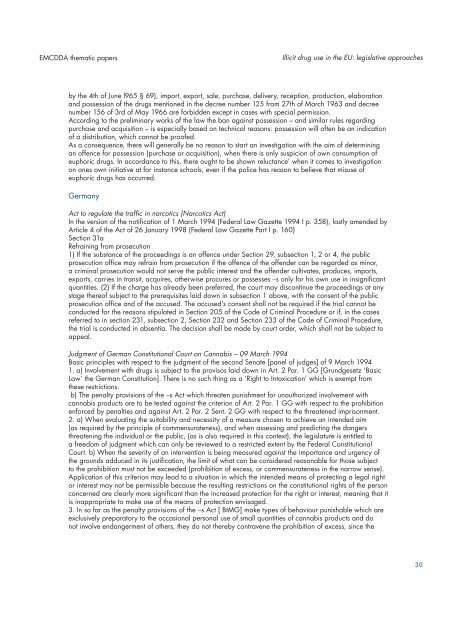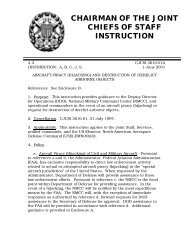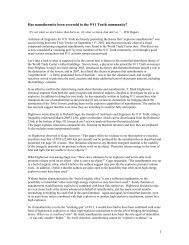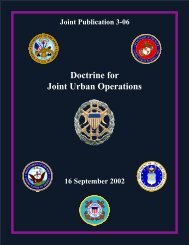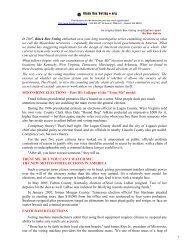illicit drug use in the eu: legislative approaches - EMCDDA - Europa
illicit drug use in the eu: legislative approaches - EMCDDA - Europa
illicit drug use in the eu: legislative approaches - EMCDDA - Europa
Create successful ePaper yourself
Turn your PDF publications into a flip-book with our unique Google optimized e-Paper software.
<strong>EMCDDA</strong> <strong>the</strong>matic papersIllicit <strong>drug</strong> <strong>use</strong> <strong>in</strong> <strong>the</strong> EU: <strong>legislative</strong> <strong>approaches</strong>by <strong>the</strong> 4th of June l965 § 69), import, export, sale, purchase, delivery, reception, production, elaborationand possession of <strong>the</strong> <strong>drug</strong>s mentioned <strong>in</strong> <strong>the</strong> decree number 125 from 27th of March 1963 and decreenumber 156 of 3rd of May 1966 are forbidden except <strong>in</strong> cases with special permission.Accord<strong>in</strong>g to <strong>the</strong> prelim<strong>in</strong>ary works of <strong>the</strong> law <strong>the</strong> ban aga<strong>in</strong>st possession – and similar rules regard<strong>in</strong>gpurchase and acquisition – is especially based on technical reasons: possession will often be an <strong>in</strong>dicationof a distribution, which cannot be proofed.As a consequence, <strong>the</strong>re will generally be no reason to start an <strong>in</strong>vestigation with <strong>the</strong> aim of determ<strong>in</strong><strong>in</strong>gan offence for possession (purchase or acquisition), when <strong>the</strong>re is only suspicion of own consumption of<strong>eu</strong>phoric <strong>drug</strong>s. In accordance to this, <strong>the</strong>re ought to be shown reluctance’ when it comes to <strong>in</strong>vestigationon ones own <strong>in</strong>itiative at for <strong>in</strong>stance schools, even if <strong>the</strong> police has reason to believe that mis<strong>use</strong> of<strong>eu</strong>phoric <strong>drug</strong>s has occurred.GermanyAct to regulate <strong>the</strong> traffic <strong>in</strong> narcotics (Narcotics Act)In <strong>the</strong> version of <strong>the</strong> notification of 1 March 1994 (Federal Law Gazette 1994 I p. 358), lastly amended byArticle 4 of <strong>the</strong> Act of 26 January 1998 (Federal Law Gazette Part I p. 160)Section 31aRefra<strong>in</strong><strong>in</strong>g from prosecution1) If <strong>the</strong> substance of <strong>the</strong> proceed<strong>in</strong>gs is an offence under Section 29, subsection 1, 2 or 4, <strong>the</strong> publicprosecution office may refra<strong>in</strong> from prosecution if <strong>the</strong> offence of <strong>the</strong> offender can be regarded as m<strong>in</strong>or,a crim<strong>in</strong>al prosecution would not serve <strong>the</strong> public <strong>in</strong>terest and <strong>the</strong> offender cultivates, produces, imports,exports, carries <strong>in</strong> transit, acquires, o<strong>the</strong>rwise procures or possesses --s only for his own <strong>use</strong> <strong>in</strong> <strong>in</strong>significantquantities. (2) If <strong>the</strong> charge has already been preferred, <strong>the</strong> court may discont<strong>in</strong>ue <strong>the</strong> proceed<strong>in</strong>gs at anystage <strong>the</strong>reof subject to <strong>the</strong> prerequisites laid down <strong>in</strong> subsection 1 above, with <strong>the</strong> consent of <strong>the</strong> publicprosecution office and of <strong>the</strong> acc<strong>use</strong>d. The acc<strong>use</strong>d’s consent shall not be required if <strong>the</strong> trial cannot beconducted for <strong>the</strong> reasons stipulated <strong>in</strong> Section 205 of <strong>the</strong> Code of Crim<strong>in</strong>al Procedure or if, <strong>in</strong> <strong>the</strong> casesreferred to <strong>in</strong> section 231, subsection 2, Section 232 and Section 233 of <strong>the</strong> Code of Crim<strong>in</strong>al Procedure,<strong>the</strong> trial is conducted <strong>in</strong> absentia. The decision shall be made by court order, which shall not be subject toappeal.Judgment of German Constitutional Court on Cannabis – 09 March 1994Basic pr<strong>in</strong>ciples with respect to <strong>the</strong> judgment of <strong>the</strong> second Senate [panel of judges] of 9 March 19941. a) Involvement with <strong>drug</strong>s is subject to <strong>the</strong> provisos laid down <strong>in</strong> Art. 2 Par. 1 GG [Grundgesetz ‘BasicLaw’ <strong>the</strong> German Constitution]. There is no such th<strong>in</strong>g as a ‘Right to Intoxication’ which is exempt from<strong>the</strong>se restrictions.b) The penalty provisions of <strong>the</strong> --s Act which threaten punishment for unauthorized <strong>in</strong>volvement withcannabis products are to be tested aga<strong>in</strong>st <strong>the</strong> criterion of Art. 2 Par. 1 GG with respect to <strong>the</strong> prohibitionenforced by penalties and aga<strong>in</strong>st Art. 2 Par. 2 Sent. 2 GG with respect to <strong>the</strong> threatened imprisonment.2. a) When evaluat<strong>in</strong>g <strong>the</strong> suitability and necessity of a measure chosen to achieve an <strong>in</strong>tended aim(as required by <strong>the</strong> pr<strong>in</strong>ciple of commensurateness), and when assess<strong>in</strong>g and predict<strong>in</strong>g <strong>the</strong> dangersthreaten<strong>in</strong>g <strong>the</strong> <strong>in</strong>dividual or <strong>the</strong> public, (as is also required <strong>in</strong> this context), <strong>the</strong> legislature is entitled toa freedom of judgment which can only be reviewed to a restricted extent by <strong>the</strong> Federal ConstitutionalCourt. b) When <strong>the</strong> severity of an <strong>in</strong>tervention is be<strong>in</strong>g measured aga<strong>in</strong>st <strong>the</strong> importance and urgency of<strong>the</strong> grounds adduced <strong>in</strong> its justification, <strong>the</strong> limit of what can be considered reasonable for those subjectto <strong>the</strong> prohibition must not be exceeded (prohibition of excess, or commensurateness <strong>in</strong> <strong>the</strong> narrow sense).Application of this criterion may lead to a situation <strong>in</strong> which <strong>the</strong> <strong>in</strong>tended means of protect<strong>in</strong>g a legal rightor <strong>in</strong>terest may not be permissible beca<strong>use</strong> <strong>the</strong> result<strong>in</strong>g restrictions on <strong>the</strong> constitutional rights of <strong>the</strong> personconcerned are clearly more significant than <strong>the</strong> <strong>in</strong>creased protection for <strong>the</strong> right or <strong>in</strong>terest, mean<strong>in</strong>g that itis <strong>in</strong>appropriate to make <strong>use</strong> of <strong>the</strong> means of protection envisaged.3. In so far as <strong>the</strong> penalty provisions of <strong>the</strong> --s Act [ BtMG] make types of behaviour punishable which areexclusively preparatory to <strong>the</strong> occasional personal <strong>use</strong> of small quantities of cannabis products and donot <strong>in</strong>volve endangerment of o<strong>the</strong>rs, <strong>the</strong>y do not <strong>the</strong>reby contravene <strong>the</strong> prohibition of excess, s<strong>in</strong>ce <strong>the</strong>30


